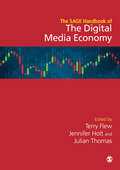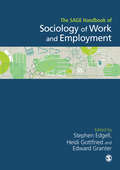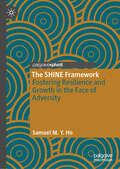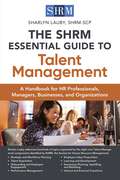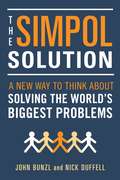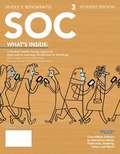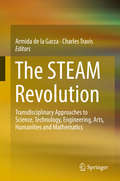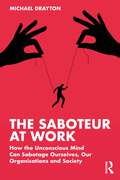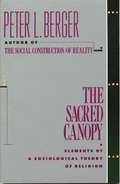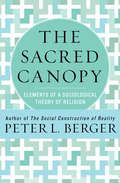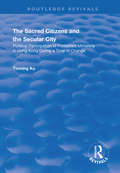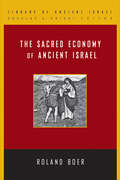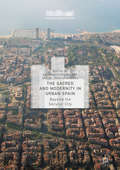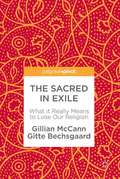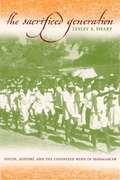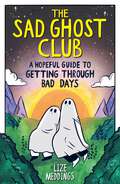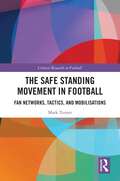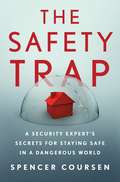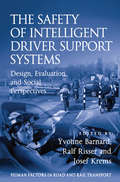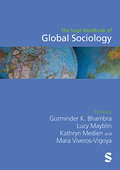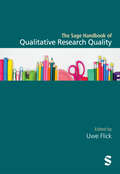- Table View
- List View
The SAGE Handbook of the Digital Media Economy
by Julian Thomas Terry Flew Jennifer HoltDebates about the digital media economy are at the heart of media and communication studies. An increasingly digitalised and datafied media environment has implications for every aspect of the field, from ownership and production, to distribution and consumption. The SAGE Handbook of the Digital Media Economy offers students, researchers and policy-makers a multidisciplinary overview of contemporary scholarship relating to the intersection of the digital economy and the media, cultural, and creative industries. It provides an overview of the major areas of debate, and conceptual and methodological frameworks, through chapters written by leading scholars from a range of disciplinary perspective. PART 1: Key Concepts PART 2: Methodological Approaches PART 3: Media Industries of the Digital Economy PART 4: Geographies of the Digital Economy PART 5: Law, Governance and Policy
The SAGE Handbook of the Digital Media Economy
by Julian Thomas Terry Flew Jennifer HoltDebates about the digital media economy are at the heart of media and communication studies. An increasingly digitalised and datafied media environment has implications for every aspect of the field, from ownership and production, to distribution and consumption. The SAGE Handbook of the Digital Media Economy offers students, researchers and policy-makers a multidisciplinary overview of contemporary scholarship relating to the intersection of the digital economy and the media, cultural, and creative industries. It provides an overview of the major areas of debate, and conceptual and methodological frameworks, through chapters written by leading scholars from a range of disciplinary perspective. PART 1: Key Concepts PART 2: Methodological Approaches PART 3: Media Industries of the Digital Economy PART 4: Geographies of the Digital Economy PART 5: Law, Governance and Policy
The SAGE Handbook of the Sociology of Work and Employment
by Heidi Gottfried Dr Edward Granter Professor Stephen EdgellThe SAGE Handbook of the Sociology of Work and Employment is a landmark collection of original contributions by leading specialists from around the world. The coverage is both comprehensive and comparative (in terms of time and space) and each ‘state of the art’ chapter provides a critical review of the literature combined with some thoughts on the direction of research. This authoritative text is structured around six core themes: Historical Context and Social Divisions The Experience of Work The Organization of Work Nonstandard Work and Employment Work and Life beyond Employment Globalization and the Future of Work. Globally, the contours of work and employment are changing dramatically. This handbook helps academics and practitioners make sense of the impact of these changes on individuals, groups, organizations and societies. Written in an accessible style with a helpful introduction, the retrospective and prospective nature of this volume will be an essential resource for students, teachers and policy-makers across a range of fields, from business and management, to sociology and organization studies.
The SAGE Handbook of the Sociology of Work and Employment
by Heidi Gottfried Dr Edward Granter Professor Stephen EdgellThe SAGE Handbook of the Sociology of Work and Employment is a landmark collection of original contributions by leading specialists from around the world. The coverage is both comprehensive and comparative (in terms of time and space) and each 'state of the art' chapter provides a critical review of the literature combined with some thoughts on the direction of research. This authoritative text is structured around six core themes: Historical Context and Social Divisions The Experience of Work The Organization of Work Nonstandard Work and Employment Work and Life beyond Employment Globalization and the Future of Work. Globally, the contours of work and employment are changing dramatically. This handbook helps academics and practitioners make sense of the impact of these changes on individuals, groups, organizations and societies. Written in an accessible style with a helpful introduction, the retrospective and prospective nature of this volume will be an essential resource for students, teachers and policy-makers across a range of fields, from business and management, to sociology and organization studies.
The SHINE Framework: Fostering Resilience and Growth in the Face of Adversity
by Samuel M. HoThis book aims to present a new evidence-based approach to the development of resilience: the SHINE framework. Created by the author himself, the SHINE framework is based on five factors: Strength-based habit-building, Hopeful thinking, Interpersonal relationships, Noticing both positives and negatives, and Embracing changes. It combines elements of cognitive psychology and positive psychology to promote long-term habit-building to increase resistance during adversities, post-adversity resilience, and constructive positive changes. Bringing together theory and practice, this timely book features assessment tools and practical strategies to foster psychological resilience in individuals and successfully show how to overcome the challenges of today&’s world. It is also an ideal reading for academics at any level, psychologists, clinicians, social workers, and social sciences students. Readers will find the information and practical exercises useful for self-care and enhancement.
The SHRM Essential Guide to Talent Management: A Handbook for HR Professionals, Managers, Businesses, and Organizations
by Sharlyn LaubyFinding and keeping great talent is a constant business challenge and HR's top priority. The SHRM Essential Guide to Talent Management is a practical desk reference for HR professionals seeking real-world solutions to the full range of talent issues. Written by Sharlyn Lauby, this guide covers hundreds of topics, organized around SHRM's eight core talent management components:· Strategic and Workforce Planning· Talent Acquisition· Onboarding and Employee Engagement· Performance Management· Employee Value Proposition· Learning and Development· Succession Planning, Upskilling, and Reskilling· Internal and External TransitionsPacked with insights, tools, and best practices, the book offers fast, effective help when you're facing hiring, coaching, or retention hurdles.A must-have resource for busy HR practitioners, it keeps you aligned with current trends while providing clear direction when it matters most.
The SIMPOL Solution: A New Way to Think about Solving the World's Biggest Problems
by John Bunzl Nick DuffellThe SIMPOL Solution, spearheaded by the Simultaneous Policy (SIMPOL) Organization, gives voters around the world a new way to pressure their leaders to address global problems ranging from climate change to mass immigration and gross income disparities.Blending politics and psychology, The SIMPOL Solution shows how through simultaneous action--through cooperation--we can overcome the problems we face today and our children will face tomorrow.The authors argue that the chief barrier to tackling pressing international issues is a vicious circle of destructive global competition, in which nations, corporations, and citizens are helplessly caught. Our current economic system--which rewards corporations and nations that offer the greatest profits no matter what the social costs--has the effect of hollowing out national politics and encouraging either voter apathy or populism championed by the Far Right.The good news is that it doesn't take masses of people to break this vicious circle and initiate lasting change. In fact, key transitions in human history were initiated by small numbers of activists. Already endorsed by leading policy-makers, visionaries, and public figures, this exciting book offers everyone a way to become a part of this important worldwide movement for change.
The SME Business Guide to Fraud Risk Management
by Robert James ChapmanAll organisations are affected by fraud, but disproportionately so for SMEs given their size and vulnerability. Some small businesses that have failed to manage business fraud effectively have not only suffered financially but also have not survived. This book provides a guide for SMEs to understand the current sources of business fraud risk and the specific risk response actions that can be taken to limit exposure, through the structured discipline of enterprise risk management. The book provides: A single-source reference: a description of all of the common fraud types SMEs are facing in one location. An overview of enterprise risk management: a tool to tackle fraud (as recommended by the Metropolitan Police Service and many other government-sponsored organisations). Illustrations of fraud events: diagrams/figures (where appropriate) of how frauds are carried out. Case studies: case studies of the fraud types described (to bring the subject to life and illustrate fraud events and their perpetrators) enabling readers to be more knowledgeable about the threats. Sources of support and information: a description of the relationship between the government agencies and departments. What to do: ‘specific actions’ to be implemented as opposed to just recommending the preparation of policies and processes that may just gather dust on a shelf. The book gives SMEs a much better understanding of the risks they face and hence informs any discussion about the services required, what should be addressed first, in what order should remaining requirements be implemented and what will give the best value for money.
The SOC Solution
by Nijole V. BenokraitisThis book covers important topics in Sociology like Culture,Socialization,Race and Ethnicity, Population, Urbanization, and the Environment,and Social Change
The STEAM Revolution: Transdisciplinary Approaches to Science, Technology, Engineering, Arts, Humanities and Mathematics
by Charles Travis Armida de la GarzaThis volume is dedicated to collaborative research across STEM disciplines, the arts and humanities. It includes six sections, framed from a global perspective and exhibits contributions from key experts in the field, emerging scholarly voices, and STEAM practitioners. The added value of STEAM projects in research is highlighted in the first section of this book. Ranging from the spatial, medical and environmental humanities to heritage science, this section discusses the course and paths STEAM projects may evolve to in the near future. The second section features reflective essays by scientists and artists on the development of their research, their professional growth and personal learning experiences that the art/science collaborations have afforded their work and careers. Sections III and IV provides practical guidance and advice on facilitating STEAM teams and describe successful collaborative projects. By presenting the objectives and outcomes of relevant research, the chapters in these sections discuss the various steps taken by different teams to achieve project fruition. Paying particular attention to barriers inhibiting STEAM collaboration, these sections also explore the ways in which research teams were able to work effectively. The fifth section presents a review of policy issues and the potential impacts of STEAM research for administrators, funders and policy makers. In its pursuit for balance and inclusion, the volume concludes with a critical reflection on STEAM that argues a different perspective and will prove food for thought to readers.
The Saboteur at Work: How the Unconscious Mind Can Sabotage Ourselves, Our Organisations and Society
by Michael DraytonThe Saboteur at Work describes how unconscious psychological processes can sabotage individual lives, the functioning of groups, teams and organisations, and even global politics. Drawing on research in the fields of psychology and organisations, this comprehensive yet straightforward and accessible book enables you to understand how the unconscious can impact progress and performance and describes practical techniques you can use to overcome the saboteur, individually and at work. The book discusses the modern understanding of our adaptive unconscious, and you will learn about repression, imposter syndrome and other defence mechanisms. Ideas are brought to life using real-world examples and personal, organisational and national stories. The book explores the mind’s capacity for self-deception by telling the story of Tony Blair and the invasion of Iraq and looks at unconscious processes in organisations, asking what role the saboteur played in huge corporate failures such as the collapse of Barings Bank and the Boeing 737 Max scandal. The saboteur also operates on a larger scale – governments and societies can be sabotaged by this unconscious force. In Nazi Germany, how did normal, decent people behave like monsters, colluding with or actively participating in the murder of innocent people? Why did big US corporates like IBM, Ford and Chrysler work with the Nazis to make the Holocaust possible? If you manage a team or lead an organisation, you need to understand the role played by the saboteur in your workplace and in your own career and life. This book enables leaders and managers to develop their leadership skills by understanding how the unconscious impacts individual, group and social processes. It will also be of use to coaches and organisational consultants working in the areas of teams and performance.
The Sacred Canopy: Elements of a Sociological Theory of Religion
by Peter L. BergerThis important contribution to the sociology of religion provides an analysis that clarifies the often ironic interaction between religion and society.
The Sacred Canopy: Elements of a Sociological Theory of Religion
by Peter L. Berger&“The most important contribution to the sociology of religion since Max Weber&’s The Protestant Ethic and the Spirit of Capitalism&” (Commonweal). Acclaimed scholar and sociologist Peter L. Berger carefully lays out an understanding of religion as a historical, societal mechanism in this classic work of social theory. Berger examines the roots of religious belief and its gradual dissolution in modern times, applying a general theoretical perspective to specific examples from religions throughout the ages. Building upon the author&’s previous work, The Social Construction of Reality, with Thomas Luckmann, this book makes Berger&’s case that human societies build a &“sacred canopy&” to protect, stabilize, and give meaning to their worldview.
The Sacred Citizens and the Secular City: Political Participation of Protestant Ministers in Hong Kong (Routledge Revivals)
by Tinming KoThis title was first published in 2000. This study addresses the political participation of Protestant ministers in Hong Kong. It aims to describe and explain the pattern of political participation of these ministers. The book focuses on a number of key questions. What kind of political participation did Protestant ministers involve themselves in during the years preceding the return to Chinese sovereignty? How extensive was their political involvement? Why were some ministers active and energetic political participants whereas some of their colleagues were inactive? How did the activists see their role as Christian ministers? What impact did the political activism of the Protestant clergy have on the social, political and religious development of Hong Kong? Dr Ko's findings offer insights into the political beliefs, values and activities of a sample of the Protestant clergy of Hong Kong and into their thinking about their political responsibilities.
The Sacred Economy of Ancient Israel
by Roland BoerThe Sacred Economy of Ancient Israel offers a new reconstruction of the economic context of the Bible and of ancient Israel. It argues that the key to ancient economies is with those who worked on the land rather than in intermittent and relatively weak kingdoms and empires. Drawing on sophisticated economic theory (especially the R#65533;gulation School) and textual and archaeological resources, Roland Boer makes it clear that economic "crisis" was the norm and that economics is always socially determined. He examines three economic layers: the building blocks (five institutional forms), periods of relative stability (three regimes), and the overarching mode of production. Ultimately, the most resilient of all the regimes was subsistence survival, for which the regular collapse of kingdoms and empires was a blessing rather than a curse. Students will come away with a clear understanding of the dynamics of the economy of ancient Israel. Boer's volume should become a new benchmark for future studies.
The Sacred and Modernity in Urban Spain
by Antonio Cordoba Daniel García-DonosoThis book explores how modernity, the urban, and the sacred overlap in fundamental ways in contemporary Spain. Urban spaces have traditionally been seen as the original sites of modernity, history, progress, and a Weberian systematic disenchantment of the world, while the sacred has been linked to the natural, the rural, mythical past origins, and exemption from historical change. This collection problematizes such clear-cut distinctions as overlaps between the modern urban and the sacred in Spanish culture are explored throughout the volume. Placed in the periphery of Europe, Spain has had a complex relationship with the concept of modernity and commonly understood processes of modernization and secularization, thus offering a unique case-study of the interaction between the modern and the sacred in the city.
The Sacred in Exile: What It Really Means To Lose Our Religion
by Gillian Mccann Gitte BechsgaardThis book addresses the fact that, for the first time in history, a large segment of the population in the western world is living without any form of religious belief. While a number of writers have examined the implications of this shift, none have approached the phenomenon from the perspective of religious studies. The authors examine what has been lost from the point of view of sociology, psychology, and philosophy of religion. The book sits at the nexus of a number of important debates including: the role of religion in public life, the connection between religion and physical and psychological well-being, and the implications of the loss of ritual in terms of maintaining communities.
The Sacrificed Generation: Youth, History, and the Colonized Mind in Madagascar
by Lesley A. SharpYouth, historical consciousness, and political agency in independent Francophone Africa are the themes that frame this study about Madagascar.
The Sad Ghost Club: A Hopeful Guide to Getting Through Bad Days (The Sad Ghost Club #4)
by Lize MeddingsWelcome to the Sad Ghost Club - a club for anyone who has ever felt sad or lost. We can all feel anxious and alone sometimes. Like you're almost . . . invisible. But at the Sad Ghost Club, you can find your kindred spirits and know you're not alone. In this graphic novel, discover the Sad Ghost Club's rules for taking things one day at a time. With heartwarming and very relatable comic illustrations, discover how to make it through the day, grow through the hard stuff and look out for your fellow ghosties. Based on the Sad Ghost Club community, with over 600k followers on Instagram. This is a place where everyone is accepted and everyone belongs.Join the community of ghosties on Instagram @theofficialsadghostclub
The Safe Standing Movement in Football: Fan Networks, Tactics, and Mobilisations (Critical Research in Football)
by Mark TurnerThis book tells the important story of the 30-year social movement against all-seated stadia in football in England and Wales that developed in the wake of the Hillsborough stadium disaster and the wider European and international significance of that movement. Examining the fan networks, relations, tactics and interactions which built the ‘Safe Standing’ movement, it reveals an untold social history of football supporter activism and represents an important contribution to our understanding of football supporter-based social movements, the sociology of football, and to social movement studies more broadly. The book argues that Safe Standing is sociologically highly significant because the restriction and partial exclusion of football fans as a social group in the timescape of English football after Hillsborough marked a moment of profound social change in the UK. Applying relational sociology, and drawing on original research and insider access, the book considers how events and ruptures, like Hillsborough, shape the dynamics of a social movement, and shows how supporters, who have been deeply affected by the all-seating legislation, are now in a position to affect the future consumption of football. The book shows how this was achieved, how a small core network of approximately 30 supporters, networked with supporter groups across Europe, now stand to impact and shape the consumption habits of a key leisure practice all over the world. This is fascinating reading for any student, researcher or policy-maker with an interest in football, sociology, political science, public policy, or cultural and social history.
The Safety Trap: A Security Expert's Secrets for Staying Safe in a Dangerous World
by Spencer CoursenThreat management expert Spencer Coursen offers proactive strategies to protect yourself and your loved ones in the event of hostile encounters and emergency situations in The Safety Trap: A Security Expert’s Secrets for Staying Safe in a Dangerous World.Despite what the news and social media would have you believe, we have never lived in a safer time than we are now. Unfortunately, we live under a false sense of security enforced by authorities that only alleviates fears without reducing risk. We have placed our personal safety, and our responsibilities of guarding it, into the hands of people trained only to respond to crises, not actively prevent them. Our blind faith in institutions to protect us has only dulled our natural survival instincts. The truth is that when we feel safest is actually when we are in the most danger.This is the paradox of The Safety Trap.When you don’t expect danger, you simply fail to see the signs that something bad is about to happen. But the signs are always there, and staying safe is about training yourself to see them. In easy-to-implement methods of maintaining vigilance, assessing risk, and taking preventative measures, you’ll discover how to be alert without anxiety and know how to best protect and defend yourself on the job, in school, in public places, at home, and online.With Coursen’s simple formula of Awareness + Preparation = Safety as your guide—as well as real world examples of managing threats—you will learn how to develop the skills and confidence to reclaim your own security and avoid The Safety Trap.
The Safety of Intelligent Driver Support Systems: Design, Evaluation and Social Perspectives (Human Factors in Road and Rail Transport)
by Ralf RisserThe development of new technologies of information and communication will, in the coming years, transform deeply their uses and practices in transport. The current developments in the field of road telematics and driver assistance systems offer a real opportunity to aid mobility and road safety. However, they also raise numerous questions about their effectiveness, possible positive and negative modifications of behaviour or attitudes and about their acceptability by drivers. Problems related to the design and evaluation of intelligent driver support systems (IDSSs) and social perspectives related to their introduction on a large scale may only be fully addressed from a multi-disciplinary point of view. People from different backgrounds, from both engineering and social sciences, should be involved in this development. This book provides such knowledge from both a human and social factors background. The Safety of Intelligent Driver Support Systems serves the training of professionals working within the transport area so that they can use this knowledge in their work. It will be of direct interest to transportation and traffic professionals, engineers, system designers, researchers and specialists working in automotive and related industries, departments of transport, and communication and public bodies related to transport in the automotive industry, public authorities, etc. Also students at Masters and PhD level, performing studies in the road transportation area, will find in this book a rich source of knowledge. Teachers and trainers, both in professional training and academic education, may use the book as a basis for giving a course on the topic addressed.
The Sage Handbook of Global Sociology
by Gurminder K. Bhambra Lucy Mayblin Kathryn Medien Mara Viveros-VigoyaThe SAGE Handbook of Global Sociology addresses the ‘social’, its various expressions globally, and the ways in which such understandings enable us to understand and account for global structures and processes. It demonstrates the vitality of thought from around the world by connecting theories and traditions, including reflections on European colonization, to build shared, rather than universal, understandings. Across 36 chapters, the Handbook offers a series of perspectives and cases from different locations, enabling the reader better to understand the particularities of specific contexts and how they are connected to global movements and structures. By moving beyond standard accounts of sociology and social theory, this Handbook offers both valuable insight into and scholarly contribution to the field of global sociology. Part 1: Politics Part 2: Labour Part 3: Kinship Part 4: Belief Part 5: Technology Part 6: Ecology
The Sage Handbook of Global Sociology
by Gurminder K. Bhambra Lucy Mayblin Kathryn Medien Mara Viveros-VigoyaThe SAGE Handbook of Global Sociology addresses the ‘social’, its various expressions globally, and the ways in which such understandings enable us to understand and account for global structures and processes. It demonstrates the vitality of thought from around the world by connecting theories and traditions, including reflections on European colonization, to build shared, rather than universal, understandings. Across 36 chapters, the Handbook offers a series of perspectives and cases from different locations, enabling the reader better to understand the particularities of specific contexts and how they are connected to global movements and structures. By moving beyond standard accounts of sociology and social theory, this Handbook offers both valuable insight into and scholarly contribution to the field of global sociology. Part 1: Politics Part 2: Labour Part 3: Kinship Part 4: Belief Part 5: Technology Part 6: Ecology
The Sage Handbook of Qualitative Research Quality
by Uwe FlickThis Sage Handbook presents an interdisciplinary collection of chapters exploring how to assess the quality of collecting and analysing qualitative data, while maintaining a focus on diversity, digital and critical approaches. The Handbook considers essential questions such as what is good qualitative research? What makes qualitative research good research? And, how can we make qualitative research better research? Contributions come from a wide array of experts, and highlight answers to questions from various disciplinary and geographical areas; from mixed methods to multimodal and online research, from specific types of data and methods to specific target groups, and from theoretical and epistemological contexts to those where funding has an impact on how research is done and assessed. Qualitative research has evolved in many respects in recent decades and has grown increasingly multidisciplinary. Research in general is facing new challenges around how to take diversity and decolonisation into account in what researchers do, as well as how to produce and communicate qualitative research quality. This Handbook offers a timely overview of such developments, and will support researchers involved in planning, designing, doing and evaluating qualitative research in developing an increased sensitivity for contemporary debates and challenges in the field. Part I Philosophies and Epistemologies of Qualitative Research Quality Part II Disciplinary Discourses of Qualitative Research Quality Part III Qualitative Research Quality for Specific Approaches Part IV Rethinking Qualitative Research Quality for Specific Methods and Data Part V Rethinking Strategies for Quality in Qualitative Research Part VI Rethinking Criteria for Quality in Qualitative Research Part VII Extending Contexts and Challenges for Qualitative Research Quality
